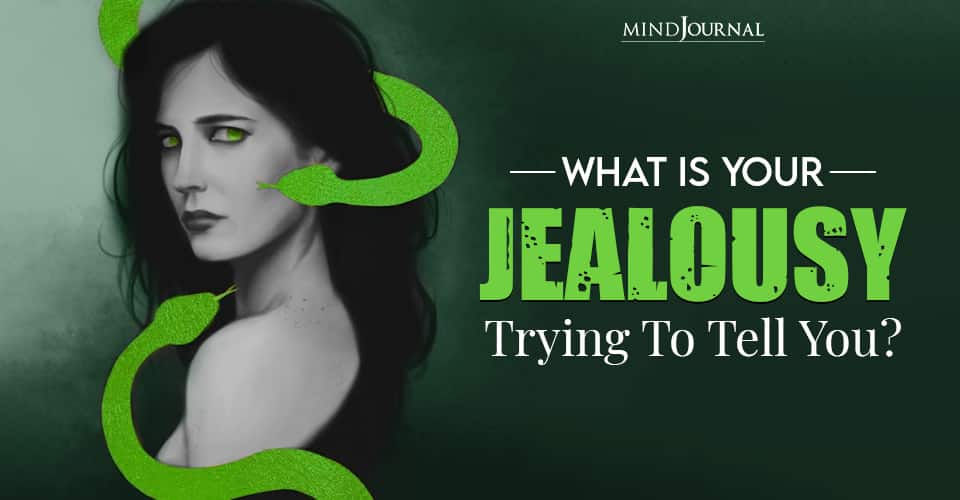Understanding jealousy. What is jealousy trying to tell you about yourself? What is jealousy and what is the emotion of jealousy trying to make you aware of? When you are feeling jealous, you are unknowingly telling yourself what is it that you’re scared of.
Jealousy involves fear with worrisome thoughts of a potential loss. Commonly, jealousy is an emotional reaction activated by the actual or anticipated interest in another person by someone we care about.
When a third party threatens the bond that exists in a partnership, we may feel insecure, rejected, worried, angry, or self-doubting, among a host of other undesirable feelings.
The emotion of jealousy is a derivative of shame. It informs us of an obstacle to the connection between ourselves and a loved one, alerting us to a threat to the relationship. The potential disconnection experienced in jealousy often involves a social comparison.
Related: 7 Little Lies Jealousy Whispers in Your Ear
Feeling Jealous: What Is Jealousy Trying To Tell You?
When you experience jealousy, you may assume that someone else is receiving the attention or adoration that you want for yourself. In some way, the other person appears more desirable.
This is the drama of shame and pride where diminishing pride dominates. As a result, you may employ one or more of the typical coping and defensive responses to the shame of jealousy, which can involve withdrawal, avoidance, attacking yourself, or attacking the other. [1]
A response to jealousy that attacks others may result in aggressive and offensive behavior. You may want to hurt the person who is a jealous rival and behave in ways that will control the person whose bond you fear losing. Such approach inclinations may manifest in behaviors aimed at breaking up the threatening liaison or re-establishing the primary relationship. [2]

Becoming avoidant when you are jealous, for instance, may lead you to abuse alcohol or drugs to relieve your feelings. Through withdrawal, you may hope that the person you have a relationship with will notice and re-establish your bond.
Attacking oneself may lead to all kinds of self-injurious behaviors. Although defensive responses to jealousy represent attempts to protect self-esteem and preserve bond that is perceived as broken, they can result in depression or loneliness.
Jealousy can blind us. A perceived threat to a relationship can induce anxiety that leads to insecurity, making us sensitive to negative emotional cues and affecting how we see the world. [3] Moreover, uncertainty about a relationship and the fear of shame can lead to an obsessive preoccupation with its status.
Related: How To Stop Being Jealous
If there is not enough psychological safety in a relationship, or if you have experienced childhood loss or abandonment that interferes with your sense of safety, you may have a hard time working through an experience of shame-based jealousy.
Many situations where feelings of jealousy are triggered may have little to do with someone else’s qualities or the interest a partner may have in another person. Instead, they may have more to do with one’s own self-perception that becomes amplified by a partner’s behavior around a third party.
Since jealousy involves a comparison, the person who experiences the emotion is left thinking they do not measure up.

Emotions evolved to inform us. Experiencing the toxicity of jealousy provides a rare opportunity to learn. We can ask ourselves some questions, rather than become hindered by our response to the emotion.
For example, are you perceiving that you lack some quality that you would like to develop for yourself? Are you experiencing jealousy because you want something more from your relationship than the relationship can provide? How do you perceive yourself and what you are doing in your life compared to others?
Related: How To Stop Being Jealous: 9 Questions You Need To Ask Yourself
Jealousy offers us an opportunity to look within, consider what we want for ourselves, reflect on how we want to be treated by others, and give thought to what we are going to do about the information.
Want to know more about what jealousy is trying to tell you? Check this video out below!
References:
[1] Nathanson, D. (1992). Shame and Pride: Affect, Sex, and the Birth of the Self. New York: Norton. [2] Harris, C. (2003). A review of sex differences in sexual jealousy, including self-report data, psychophysiological responses, interpersonal violence, and morbid jealousy. Personality and Social Psychology Review, 7, 102–128. [3] Most, S., Laurencau, J., Graber, E., Belcher, A., & Smith, C. (2010). Blind Jealousy? Romantic insecurity increases emotion-induced failures of visual perceptions. Emotion, 10, 250-256.
Written By Mary C. Lamia Ph.D. Originally Published On Psychology Today










Leave a Reply